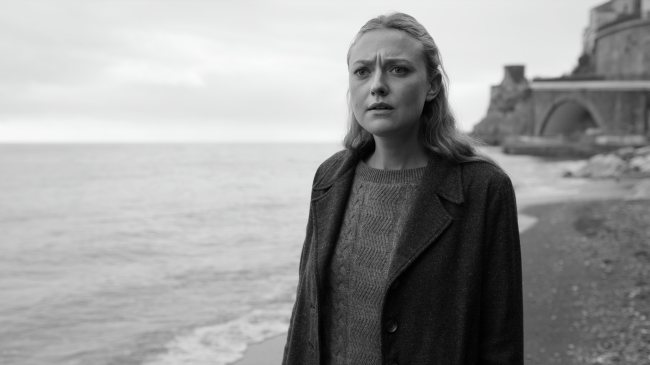By providing your information, you agree to our Terms of Use and our Privacy Policy. We use vendors that may also process your information to help provide our services. This site is protected by reCAPTCHA Enterprise and the Google Privacy Policy and Terms of Service apply.
Dakota Fanning Gave ‘Ripley’ Its Backbone

Dana Harris-Bridson


On June 6, the 2024 IndieWire Honors ceremony will celebrate 13 creators and stars responsible for some of the most stellar work of the TV season. Curated and selected by IndieWire’s editorial team, the event is a new edition of previous IndieWire Honors ceremonies, this time focused entirely on television. We’re showcasing their work with new interviews leading up to the Los Angeles celebration.
Dakota Fanning is ready to argue. You name the time, the place, and she’s ready to go.
“I can argue. I can outargue the best of ’em,” said Fanning. “My whole family and everyone that knows me [knows] I missed my calling: I could have been a good lawyer.”
Fanning’s portrayal of Marge Sherwood in Netflix’s “Ripley” suggests that the aspiring American writer who’s relocated to the Italian seaside may have missed her calling, too. Hiding behind that chirp of a name is a woman of prickly intelligence who has the presence of mind to resist the seduction of Andrew Scott’s Tom Ripley, while never underestimating his menace.
Marge has all the accessories of a bourgeois bohemian expat — the hot wannabe-artist wastrel boyfriend Johnny Flynn (Dickie Greenleaf), the bleached-white walkup studio with a stunning view of the Amalfi Coast — but in her heart she knows it’s all something of a put-on. That’s why, from the moment she sees Ripley on the beach as he pretends to recognize Dickie and prepares to insinuate himself into their lives, Marge doesn’t buy it. From her cool “Hello,” game recognizes game.
Their introduction ignites an intense pursuit in which Marge knows Tom is a fraud, Tom knows she’s on to him, but neither will voice their conviction or even acknowledge the chase. That tension informs the eight breathtaking episodes of “Ripley” and Fanning creates a performance that is every bit the match for Scott’s own.
“What makes working with her memorable is that you sort of don’t need to talk too much,” Scott told IndieWire. “I always notice that one of Dakota’s expressions when she’s being directed, or in any situation, is like, [American accent] “Got it. Yeah, I got it, I got it.” She’s incredibly practical. Both of us, in a sense, had a similar trajectory because we both started off as child actors. I mean, she was a child star, I was a child actor, but I think that meant that she had just an understanding of what’s required, but more importantly, what’s not required. Children have a great sense of practicality and a sense of a real ease with their own playfulness. They don’t want to make it any harder than it needs to be.”

For her part, Fanning credits her performance entirely to series creator Steve Zaillian, who adapted Patricia Highsmith’s “The Talented Mr. Ripley” (not Anthony Minghella’s 1999 film, which also drew from Highsmith’s 1955 novel) and directed all of the episodes.
“Anything that I’ve done in this show or with this performance leads back to Steve Zallian,” Fanning said over Zoom. “The scripts were breathtaking. When there’s really detailed scripts, you’re like, ‘Well, half of that won’t make it in.’ That was not true with this at all. He’s the most detailed filmmaker, writer, person that I’ve ever worked with. Everything was important. I try to think that every scene is important, no matter how big or small, but there are days when you’re like, ‘Yeah, I’m not saying any lines.’ You know what I mean? ‘It’s the back of my head.’ The back of my head was also super important to Steve.”
Fanning pointed out that Zallian wrote the story through Tom’s perspective; Marge is even introduced is through Tom’s eyes. “But of course, that’s not the way that Marge would see herself or the way that the world would see Marge, or the way that other characters would see Marge,” she said. “Where the work came in was building Marge’s perspective and reality.”
That internal work is key to the series’ success. While this is clearly the story of Tom Ripley — we learn little about Marge before her life in the (fictional) Mongibello, or what brought her there — it’s Marge who becomes the audience’s proxy, the one grounded person in a world seemingly populated entirely by frivolous people.
For Fanning, that meant Marge often lived in the subtext. “Some of the scenes, if you took them at face value, would have a completely different meaning,” she said. “There’s a lot of scenes and a lot of dialogue where — this is not an exact line, but just for instance — she’s saying, ‘Have a nice day,’ but she’s saying, and meaning, ‘I hope your day is shit.’”
Fanning, 30, pulls off a performance that’s electrifying and subtle in equal measure. It’s a tricky balance that isn’t showy; perhaps it’s only earned after an actor spends their life doing almost nothing else. She’s been a working actor for a quarter century (first gig: a Tide commercial), but never saw herself as a child actor.
“I sort of always resented ‘child actor,’ she said. “I was like, ‘I can’t work as many hours, just because I’m small, but I’m doing the same thing as all the other actors.’ I was also really fortunate to work with people who saw me as more than, ‘Bring the kid in.’” Those people included her 2001 “I Am Sam” co-stars Sean Penn and Michelle Pfeiffer and Tony Scott, her director on the 2004 “Man on Fire” starring Denzel Washington.
“I was treated with kindness and respect and care. I was a young person doing a job that not all young people do,” she said. “Michelle Pfeiffer didn’t have to decorate my trailer for my seventh birthday, but she did. People didn’t have to go above and beyond to give me these experiences while I was doing something that not a lot of other kids were doing. But they all did. I am very grateful that I worked with people who treated me appropriately for my age, but also with a lot of respect. My career and my life could be very different had I worked with different people.”
Fanning acknowledged that her perspective on being a child actor is very different compared to current conversations driven by the controversial ID/HBO documentary series “Quiet on Set.”
“I was given that respect when it came to the work, but there was still a lot of play and a lot of fun,” she said. “I don’t think about it as like, ‘Well, that day I had to go to work when I was 10 years old.’ It wasn’t like that. I just feel very blessed to be able to look back with a lot of joy.”

A current source of joy is her work as a partner in Lewellen Pictures, the production company she formed with her younger sister Elle. They produced the upcoming Hulu documentary series and Tribeca Festival premiere “Mastermind: To Think Like a Killer,” which follows Dr. Ann Burgess, a specialist in the FBI’s Behavioral Science Unit whose work transformed serial murder investigations. (Burgess also served as inspiration for the character of Dr. Wendy Carr in the Netflix series “Mindhunter.”)
“I am somebody who has always been obsessed with the behavioral analysis part of the true-crime world and the psychology of it,” Fanning said. “‘Criminal Minds,’ I watched that religiously for years. It’s always cool to be a part of something behind the scenes that you would be a true viewer of in real life.”
For the possibilities of directing, she’s less certain. In 2018, she directed the short film “Hello Apartment,” which was part of the ongoing “Women’s Tales” series sponsored by the Miu Miu fashion line; contributors include Ava DuVernay, Agnes Varda, Miranda July, and Janicza Bravo. Starring Eva Hewson, “Hello Apartment” is an affecting illustration of a young adult’s uncertainty — which also illustrated Fanning’s own state of mind on the project.
“I think what I learned is I could never [direct] again unless… it would have to be something that I couldn’t not do,” she said. “I was so riddled with anxiety doing it. I’m very self-assured as an actor, and I know what I’m supposed to be doing, and I know how it works from that point of view. But usually the most important relationship that you have is with the director and they’re going to catch you if you fall. And then all of a sudden, that was me.”
To hear her tell it, acting always will be the profession to beat. “It can be difficult, and it can be discouraging, [but] I achieve a state of calm and flow and that whole thing when I’m working that I have never been able to necessarily achieve anywhere else. It’s a place where — even just the simple thing of being on our phones all the time, and people are calling, people are texting, and people are, ‘Where are you? What are you doing? Can you do this? Can you do that?’ When I’m working, all that goes away. I don’t bring my phone on set. I don’t care if people know where I am. If they really need to get in touch with me, they know who to call and I don’t have to worry about it. It’s a freedom that I feel that I have never felt really anywhere else in my life.”
However, “Hello Apartment” taught her that directors have a failsafe of their own. “I was nervous that I wouldn’t enjoy the post process as much,” she said. “It’s something as an actor that you’re really not involved in [and] I loved that process so much. That was one of the biggest surprises for me about that whole experience. It also gave me insight, I think, that I’ve brought with me as an actor since, is what you can create in the editing room. Which I knew before, but seeing it happen in real time … there are days on set where you’re like, ‘Oh my God, that wasn’t right. That was wrong. Oh no, how are they going to fix that?’
“And then you see the world of possibilities that happens in post,” she said. “It gave me a little bit of a peace as an actor: Everything doesn’t always have to be perfect.”
By providing your information, you agree to our Terms of Use and our Privacy Policy. We use vendors that may also process your information to help provide our services. This site is protected by reCAPTCHA Enterprise and the Google Privacy Policy and Terms of Service apply.

















